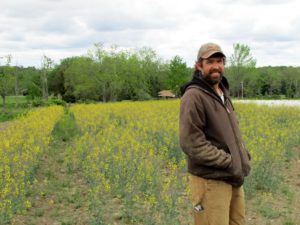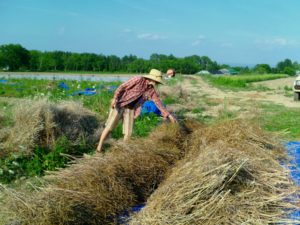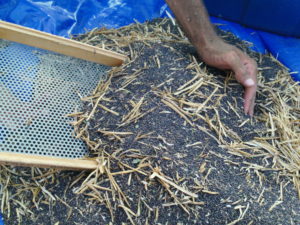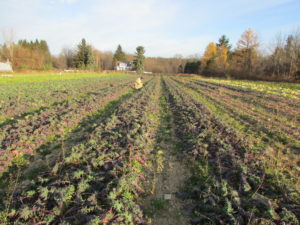Seeds, Chefs, and Sustainable Agriculture
What sows local food? Seeds!
Most of the seed sown in the Northeast is grown in arid climates, often thousands of miles away. However, a burgeoning awareness that local food starts with local seed has come to the table, with passionate voices joining the conversation.
“Food is life,” says Scott Signori, head chef and owner of Stonecat Cafe in Hector, New York. “Food is a reflection of how you live. We have phenomenal soils and fantastic farmers here in the Finger Lakes. Now we have the seeds to sow.”
Chefs play a key role in our food system, connecting farmer and eater as they craft the leading edge of food and culture. Increasingly, chefs are asking how and where food is grown and some of their choices are beginning to influence the very DNA of their ingredients.
This is not new. For the last 14 millennia, seeds have been selected and saved, flavor and regional resilience the key selections. Those who selected the seeds (breeders) and those who those crops sustained (eaters) have often been one and the same. By contrast, the focus of crop breeding for the last several decades has been yield, uniformity, and shelf-stability, guided almost entirely by the interests of multinational corporations rather than public interest. Modern breeders and eaters are as removed from conversations and collaborations with one another, often thousands of miles apart both literally and figuratively.
However, breeders, farmers, chefs and eaters are now collaborating to cultivate crops with increasing public interest, flavor and regional resilience back at the forefront.
Nathaniel Thompson owns and operates Remembrance Farm in Trumansburg, New York. He cultivates 100 acres, focusing on greens and root crops. He is excited to be growing seed for many of these crops in collaboration with Fruition Seeds, a company in the Finger Lakes customizing certified organic regionally adapted seed. Thompson plants and cultivates the seed crops and Fruition Seeds selects, harvest and cleans the crop. “Regional and on-farm seed production develops quality, stable genetics for our farm,” remarks Thompson. “A single generation of well-selected seed makes an astonishing difference.”
“There is no replacing seed customized to your particular soils, climate, harvest and market needs,” agrees Matthew Goldfarb, co-founder of Fruition Seeds. “Working with Remembrance offers the opportunity to select from large crop populations, allowing for greater diversity, specificity and resilience simultaneously in the seeds produced.”
Thompson, in partnership with Fruition, grows seed for nearly a dozen varieties of greens, from kale to lettuce. “We are interested in salad mixes with interesting colors, textures, flavors with uniform maturity to make harvest practical,” says Thompson. On-farm breeding offers him the visual and gastronomic diversity he is after while ensuring only the uniformly maturing plants seeds are saved. With each generation these seeds are becoming more and more customized to his soils, climate, cultivation practices and taste. His own taste as well as his community.
Thompson appreciates being a part of a collective CSA where he is able to hear, first-hand, how people enjoy his produce. Increasingly, the personal relationships he is building with local chefs are deepening his interest in food, culture and seed. “Chefs understand the subtle qualities of food,” observes Thompson, “I love to work with chefs willing to make the effort.”
“Such incredible local food, readily available, is a dream come true,” says Justin Paterson of Hazelnut Kitchen in
Trumansburg, one of two restaurants within ten miles of Remembrance Farm that are truly “making local mean local,” as Thompson put it. Offering menus almost exclusively from what is regionally and seasonally available, Hazelnut Kitchen and Stonecat Cafe are playing a significant role in shaping food in the Finger Lakes. Local, regionally adapted seed sends those roots even deeper.
“We are fortunate to be so spoiled,” explains Scott Signori. “Our local flavors are full of life and come from a world of inspiration.” Signori is the head chef of Stonecat Cafe, tucked among vineyards above Seneca Lake in Hector. Seed is the next level of connection that Scott is exploring. “Heirloom varieties are being brought again to life and new varieties are being created. Food is a reflection of life itself. And life here is good.”
Both Stonecat and Hazelnut Kitchen tuck Remembrance Farm’s salad mix into everything they can. ‘Flower Power,’ Thompson’s signature blend of lettuces, mustard greens, herbs and flowers is a perennial favorite. “It is just amazing, absolutely delicious,” exclaims Signori. Paterson loves the flavors and textures so much he decided to put an undressed salad on the menu. “People regularly say this is the best salad they’ve ever had,” says Signori.
The seeds of almost every element in Remembrance Farm’s salad mix is produced on the farm. “We are so thrilled to be growing seed with Remembrance,” shares Goldfarb. “Each selection is made with the insight of local breeders, growers, chefs and eaters who are committed to flavor, resilience and beauty. And the difference is already on the plate.”
“Farm to table is here to stay,” observes Paterson. “As chefs, we find ways to go deeper, more intimate, more connected. Local seed is the next level.”
Each of us play a significant role in our food system: we eat every day. Whether you sow the seeds, prepare the meal or simply sit down to the table, you are influencing the seeds being selected and sown around the world. Seeds are the small, unassuming heart of resilience. Join the conversation!





